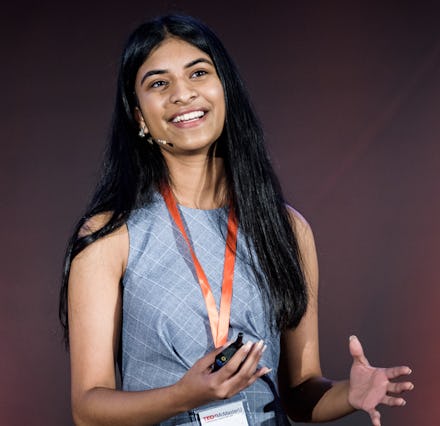17-year-old Riya Karumanchi is already the CEO of her own company, and she’s just getting started

It was a conversation with a friend’s visually impaired grandmother that gave 17-year-old Riya Karumanchi the idea to reinvent the standard white cane. Her SmartCane uses haptic-based GPS navigation and proximity sensors to help blind people more safely navigate the world around them. Over the past several months, she’s worked with friends to develop a pregnancy subscription box that delivers prenatal essentials to expecting moms and wearable tech for nursing homes that tracks stats like temperature and heart rate.
This all goes to say, Karumanchi is a problem solver. Her entrepreneurial journey began at age 12, when she and her parents discovered a program called ZeroToStartup where teens are taught entrepreneurial skills in business and technology. It was there that she worked on her first venture called Smart Streetlights, an effort to help infrastructure in her home city of Toronto to become more sustainable by incorporating motion and air-quality sensors.
Recently, Karumanchi spoke with Mic about turning an idea like SmartCane into a reality, why teens are uniquely suited to be entrepreneurs, and her goal of helping a billion people.
This interview has been lightly edited for length and clarity.
How were you able to turn your idea for a SmartCane into a reality?
To find out that this device hadn’t been updated in like a century was crazy to me. It was causing a lot of problems because it could only detect ground-level obstacles. I was brainstorming a bunch of ideas, and my school science fair was coming up as well.
I thought it was a great opportunity to build a prototype. It started out as a shoe, but as we talked to more people, it later transitioned into a cane. After the science fair ended, it became more than just a project to me. I wanted to turn it into a company and actually see it in the hands of people.
[A program called] The Knowledge Society equipped me with the skills I needed to actually turn something into a company. But it was still really hard and ambiguous. I went to different health-focused and accessibility-focused hackathons where you pitch an idea, find people who are interested in the same thing as you, and form a team.
I was able to meet a lot of amazing people who were interested in accessibility and who were experts in their field. We were working with people who were professors from the University of Toronto and MIT students. I thought the best thing I could get out of it was knowledge, but it was crazy because we actually ended up winning the competition. We won a $40,000 prize package and getting that initial funding definitely kickstarted things quite a bit.
Who are some of your role models that you’ve looked to throughout your journey as an entrepreneur?
There are so many! Definitely my peers at The Knowledge Society who inspire me with the amazing things they’re doing. Founders Nadeem and Navid Nathoo are mentors of mine. I am also extremely inspired by my parents; seeing how hard they work everyday to support me and support our family.
Elon Musk is one of my biggest role models — I look up to him a lot. I admire everything that he’s doing to push humanity forward and how he takes an unconventional approach to solve problems around the world. Sheryl Sandberg, as well, she’s the COO of Facebook. It’s great to have a female figure to look up to in a space I’m interested in.
What unique advantages do you feel like young people have as entrepreneurs?
I think one of the biggest things is how young you are and the time that you have. You don’t have to have a job to support a family, you don’t have to pay bills. If you have an idea, go for it. The worst thing that can happen is you learn from it. It’s important to fail as much as possible and learn when you’re young. Do online courses, start companies, try different things, try to find what that thing is that makes you interested and excited to wake up every day.
Take advantage of all the resources in your communities, as well as incubation centers and startup hubs, if applicable.
What are some of your future plans, some things you’re excited about in the next year or two?
I’m going into grade 12, and I’ll be applying to post-secondary at the end of this year. I’m hoping to go into engineering or computer science, it’s something that really interests me. I see it not as an entity of its own, but a tool that we can use to solve important problems. I’m definitely interested in going into a field like that, but at the same time I’d still like to work on my startups and develop a depth of knowledge in various technological disciplines.
For me, it’s extremely important to grow my network and the relationships that I have with people. I hope to start something big that can solve a global problem. In my lifetime, I would like to impact a billion people and become a unicorn person. Not a company that raises a billion dollars in revenue but a unicorn person, someone who can impact a billion people.